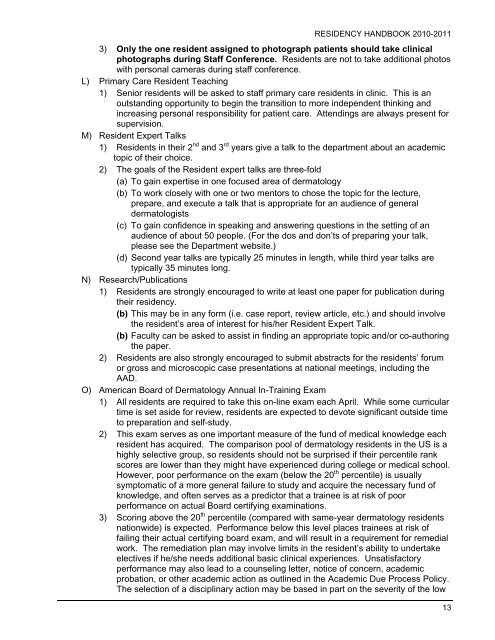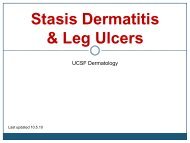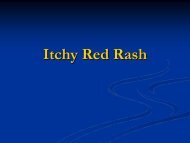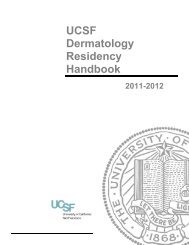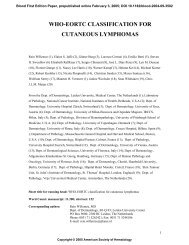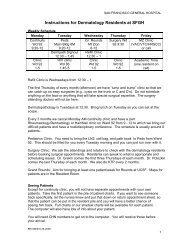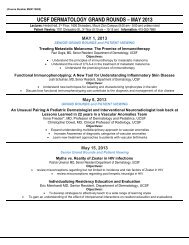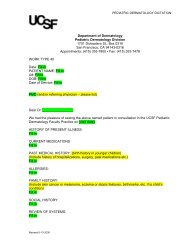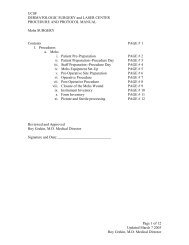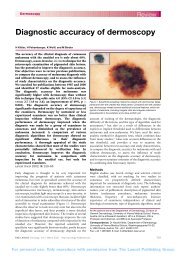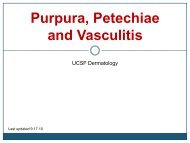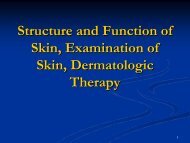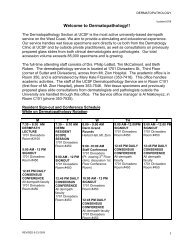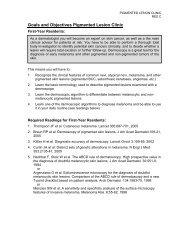UCSF Dermatology Residency Handbook - Dermatology - University ...
UCSF Dermatology Residency Handbook - Dermatology - University ...
UCSF Dermatology Residency Handbook - Dermatology - University ...
Create successful ePaper yourself
Turn your PDF publications into a flip-book with our unique Google optimized e-Paper software.
RESIDENCY HANDBOOK 2010-2011<br />
3) Only the one resident assigned to photograph patients should take clinical<br />
photographs during Staff Conference. Residents are not to take additional photos<br />
with personal cameras during staff conference.<br />
L) Primary Care Resident Teaching<br />
1) Senior residents will be asked to staff primary care residents in clinic. This is an<br />
outstanding opportunity to begin the transition to more independent thinking and<br />
increasing personal responsibility for patient care. Attendings are always present for<br />
supervision.<br />
M) Resident Expert Talks<br />
1) Residents in their 2 nd and 3 rd years give a talk to the department about an academic<br />
topic of their choice.<br />
2) The goals of the Resident expert talks are three-fold<br />
(a) To gain expertise in one focused area of dermatology<br />
(b) To work closely with one or two mentors to chose the topic for the lecture,<br />
prepare, and execute a talk that is appropriate for an audience of general<br />
dermatologists<br />
(c) To gain confidence in speaking and answering questions in the setting of an<br />
audience of about 50 people. (For the dos and don’ts of preparing your talk,<br />
please see the Department website.)<br />
(d) Second year talks are typically 25 minutes in length, while third year talks are<br />
typically 35 minutes long.<br />
N) Research/Publications<br />
1) Residents are strongly encouraged to write at least one paper for publication during<br />
their residency.<br />
(b) This may be in any form (i.e. case report, review article, etc.) and should involve<br />
the resident’s area of interest for his/her Resident Expert Talk.<br />
(b) Faculty can be asked to assist in finding an appropriate topic and/or co-authoring<br />
the paper.<br />
2) Residents are also strongly encouraged to submit abstracts for the residents’ forum<br />
or gross and microscopic case presentations at national meetings, including the<br />
AAD.<br />
O) American Board of <strong>Dermatology</strong> Annual In-Training Exam<br />
1) All residents are required to take this on-line exam each April. While some curricular<br />
time is set aside for review, residents are expected to devote significant outside time<br />
to preparation and self-study.<br />
2) This exam serves as one important measure of the fund of medical knowledge each<br />
resident has acquired. The comparison pool of dermatology residents in the US is a<br />
highly selective group, so residents should not be surprised if their percentile rank<br />
scores are lower than they might have experienced during college or medical school.<br />
However, poor performance on the exam (below the 20 th percentile) is usually<br />
symptomatic of a more general failure to study and acquire the necessary fund of<br />
knowledge, and often serves as a predictor that a trainee is at risk of poor<br />
performance on actual Board certifying examinations.<br />
3) Scoring above the 20 th percentile (compared with same-year dermatology residents<br />
nationwide) is expected. Performance below this level places trainees at risk of<br />
failing their actual certifying board exam, and will result in a requirement for remedial<br />
work. The remediation plan may involve limits in the resident’s ability to undertake<br />
electives if he/she needs additional basic clinical experiences. Unsatisfactory<br />
performance may also lead to a counseling letter, notice of concern, academic<br />
probation, or other academic action as outlined in the Academic Due Process Policy.<br />
The selection of a disciplinary action may be based in part on the severity of the low<br />
13


